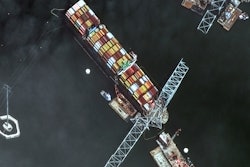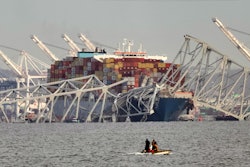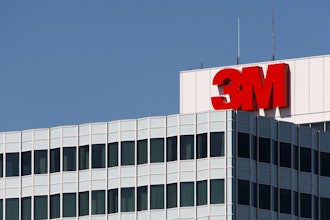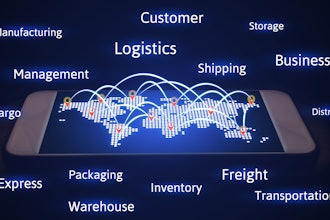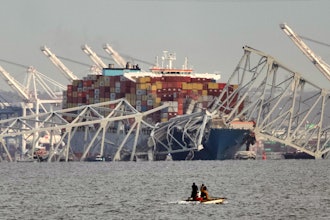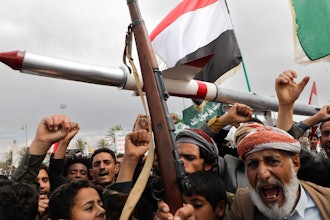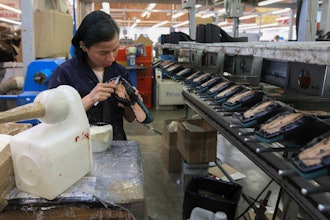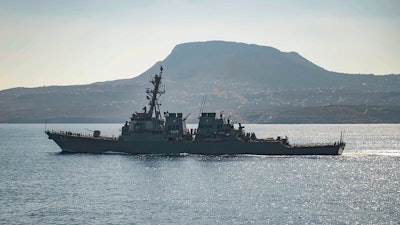
LONDON (AP) — The attacks on commercial vessels in the Red Sea by Yemen's Houthi rebels have scared off some of the world's top shipping companies and oil giants, effectively rerouting global trade away from a crucial artery for consumer goods and energy supplies that is expected to trigger delays and rising prices.
BP said Monday that it has "decided to temporarily pause all transits through the Red Sea," including shipments of oil, liquid natural gas and other energy supplies. Describing it as a "precautionary pause," the London-based oil and gas corporation said the decision faces ongoing review but crew safety was the priority.
Both oil and European natural gas prices rose partly over market nerves about attacks by the Iranian-backed Houthis, who confirmed two new attacks Monday. It is the latest targeting of container ships and oil tankers passing through a narrow waterway that separates Yemen from East Africa and leads north to the Red Sea and Suez Canal, through which an estimated 10% of the world's trade passes.
Besides critical energy supplies reaching Europe and beyond on tankers, food products like palm oil and grain and most of the world's manufactured products move by container ships — many of them heading through the Suez Canal.
"This is a problem for Europe. It's a problem for Asia," said John Stawpert, senior manager of environment and trade for the International Chamber of Shipping, which represents 80% of the world's commercial fleet.
He noted that 40% of Asia-Europe trade normally goes through the waterway: "It has the potential to be a huge economic impact."
Almost all goods that stores needed for Christmas will have already been delivered, but online orders could be delayed, analysts say, because four of the world's five largest container shipping companies have paused or rerouted movements through the Red Sea in the last several days.
MSC, Maersk, CMA CGM Group and Hapag-Lloyd are leaders in alliances that move the bulk all consumer goods between Asia and Europe, so "virtually all services will have to make this rerouting," said Simon Heaney, senior manager of container research for Drewry, a maritime research consultancy.
Ships will have to go around the Cape of Good Hope at the bottom of Africa instead, adding what some analysts have said could be a week to 10 days or even longer to voyages.
Depending on what companies decide to do, they will have to add more ships to make up the extra time or burn more fuel for the longer journey and if they decide to go faster to meet their itineraries — both of which would release more climate-changing carbon dioxide, Heaney said.
"The impact will be longer transit times, more fuel spent, more ships required, potential disruption and delays — at least in the first arrivals in Europe," he said, noting that ships could arrive to ports from their longer journeys "in clumps."
That brings up the cost of shipping, but "I don't think it's going to go to the heights that it reached during the pandemic," Heaney said.
Supply chain disruptions increased as people stuck at home during the COVID-19 pandemic ramped up orders for all sorts of products, driving up consumer prices around the world.
Stawpert of the shipping chamber said he would expect to see some price increases for consumers in the short term but that it depends how long the security threat lasts.
The Houthis have targeted Israeli-linked vessels during Israel's war with Hamas but escalated their attacks in recent days, hitting or just missing ships without clear ties.
Brig. Gen. Yahya Saree, the Houthi military spokesman, said Monday that they launched what he described as "naval aircraft" at the Cayman Islands-flagged Swan Atlantic, a chemical and oil products carrier, and Panama-flagged MSC CLARA cargo ship. He didn't offer further details.
Denmark-based operator Uni-Tankers said the Swan Atlantic, which was carrying vegetable oils to France's Reunion Island off Madagascar in the Indian Ocean, was hit by an unknown object that ignited a small fire. Crew members put it out and all were reported to be safe, the company said. It received military aid and continued on its journey.
U.S. Defense Secretary Lloyd Austin said at a news conference during a visit to Israel that he was convening a meeting of his counterparts in the Middle East and beyond on Tuesday to address the Houthi risk to shipping.
"These attacks are reckless, dangerous, and they violate international law," Austin said. "We're taking action to build an international coalition to address this threat."
U.S., French, U.K. and other coalition warships already patrol the area, keeping the waterway open. Stawpert said deployments by navies have increased and that should boost confidence in the shipping industry and ease the threat to some degree.
"We would also hope for a surge in forces, given how important this is to the world economy and people around the world," he said.
Disruptions expected from the Red Sea could have far-reaching effects because they would happen at the same time ships are being restricted through the Panama Canal, a major trade route between Asia and the United States.
Some companies had planned to reroute to the Red Sea — which is a crucial thoroughfare for Asia-Europe shipments — to avoid delays at the Panama Canal caused by a lack of rainfall, analysts say.
Now, some may be scared away from that alternative by the threat of Houthi attacks. That means those taking extra precautions to avoid risks and delays from both global trade arteries will have to take the longer journey around Africa.
"It's unprecedented that the two have coincided," the analyst Heaney said, adding that neither the Suez nor Panama canals are closed, "it's just that they're becoming less viable for the short term."
The cancellations also will mean problems for cash-strapped Egypt, he said, with millions in fees that shipping companies pay to clear the Suez Canal representing a big source of income for a country whose economy is struggling with high inflation and a weakening currency.




